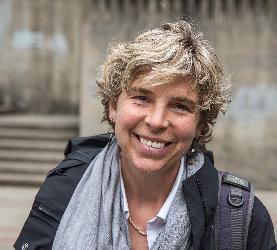Affiliated Faculty

- Pronouns she, her, her, hers, herself
- Title
- Professor
- Division Physical & Biological Sciences Division
- Department
- Ecology & Evolutionary Biology Department
- Affiliations Environmental Studies Department, Rachel Carson College
- Phone 831-459-5017
- Fax 831-459-5353
- Website
- Office Location
- CSC Coastal Biology Building, 260
- Office Hours Fall 2022: Tuesdays 11-12, https://ucsc.zoom.us/j/2775049074?pwd=VkdkTzdqcS84ZXlWQWErU3RxaFlldz09, and by appointment.
- Mail Stop CBB/EE Biology
- Mailing Address
- 130 McAllister Way
- Santa Cruz CA 95060
- Faculty Areas of Expertise Ecology, Plant Biology, Conservation, Land Management, Evolution, Population Biology
- Courses Plant Ecology (BIOE 145), Advanced Evolutionary Biology (BIOE 279), Field Methods in Plant Ecology (BIOE 145L), Introduction to Field Ecology and Conservation (BIOE 82), Plants and Society (BIOE 118)
- Advisees, Grad Students, Researchers Sara Eloise Grove, Nicky Lustenhouwer, Miranda Kathleen Melen, Edith Lai, Serena Vilaga Barasi
Summary of Expertise
Plant ecology and evolution, invasion biology, plant conservation, restoration
Research Interests
Plant Ecology, Biology Of Species Invasions, Disease Ecology
I seek to understand what controls plant distribution and abundance, with an emphasis on species interactions. Much of my current work focuses on the evolutionary ecology of plant-insect mutualisms and plant-pathogen interactions.
For many of my research questions I use biological invasions as a tool to study ecological processes. Exotic species, which can be seen as perturbations to natural communities, give us an opportunity to study ecological and evolutionary shifts in response to new conditions and new species interactions.
Biological invasions are also one of the most urgent conservation issues of our time. I have an interest in both documenting the ecological impacts of particular invasions, and understanding the biological mechanisms behind those impacts. At the interface between science and policy, can we use theoretical ecology to help make better prioritization decisions for species eradication or control? Can we accurately assess the risk of introducing new species?
Biography, Education and Training
A.B., University of Chicago
Ph.D., University of Washington
Miller Postdoctoral Fellow, Department of Integrative Biology, UC Berkeley
Research Associate, Smithsonian Tropical Research Institute, Panama
Honors, Awards and Grants
Fellow, Ecological Society of America
Fellow, California Academy of Sciences
UCSC Committee on Teaching, Excellence in Teaching Award
Chancellor’s Achievement Award for Diversity
Fulbright Fellow
First recipient, Jean H. Langenheim Endowed Chair in Plant Ecology and Evolution
Jane Block Distinguished Lecture in Conservation Biology, at The Center for Conservation Biology, University of California, Riverside
Walton Lecture Recipient, Mountain Lake Biological Station, University of Virginia
University of Washington’s first annual “Leaders in Biology” speaker
